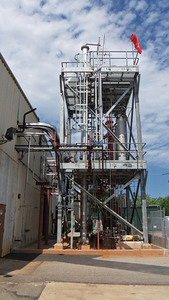Return of Cellulosic Bio-Fuels? American Process Woody Biomass Ethanol Goes Commercial
![]() Print this Article | Send to Colleague
Print this Article | Send to Colleague
 On Friday April 18, American Process, Atlanta, Ga., USA, shipped its second commercial ethanol cargo and sold its first cellulosic ethanol RINs from its Alpena, Mich., Biorefinery. These are the first cellulosic ethanol RINs generated since the beginning of 2013, and also the first commercial cellulosic ethanol RINS generated from woody biomass in in the US. American Process is the first company to produce commercial quantities of cellulosic ethanol from mixed forest residue.
On Friday April 18, American Process, Atlanta, Ga., USA, shipped its second commercial ethanol cargo and sold its first cellulosic ethanol RINs from its Alpena, Mich., Biorefinery. These are the first cellulosic ethanol RINs generated since the beginning of 2013, and also the first commercial cellulosic ethanol RINS generated from woody biomass in in the US. American Process is the first company to produce commercial quantities of cellulosic ethanol from mixed forest residue.
Theodora Retsina, founder and CEO of American Process, was interviewed concerning the significance of this unique achievement.
According to Retsina, "this is a start; it is a time to be proud but not to gloat. Instead, we should do two things. First, we should send a message of encouragement to everybody in our community of biorefineries, to persevere and to overcome the many difficulties that we all face. It is difficult, takes longer that we all think, but it is possible and our industry will grow and thrive."
"Second, it is a time to remember and thank all of the people that made this day possible. I want to recognize and thank all my colleagues at American Process whose perseverance, hard work and continuous innovation helped us arrive at this moment. At American Process we truly view every problem as an opportunity!"
"I want to state emphatically that the Alpena Biorefinery would not have existed without the financial support of the DOE. The Alpena Biorefinery was the winner of one of the integrated biorefinery demonstration awards from the DOE. Besides this financial commitment, the DOE employees have been with us along the way helping in many other ways, encouraging and supporting us on our journey to this day.
"A most significant thank you and recognition goes also to GranBio, who in 2013 became our partner and shareholder. We have benefited not only from their investment, but their CEO Bernardo Gradin brought to us a vision and a resolve that is necessary to build a transformational industry. We look forward to more cellulosic ethanol being sold in the U.S. by GranBio’s Bioflex 1 plant very soon," Retsina said.
Theodora was asked "What next?"
"The Alpena Biorefinery is a near-commercial demonstration plant of our GreenPower+ technology, which produces C5 sugars and/or ethanol from the hemicelluloses of any type of biomass. We have already sold our first commercial license of this technology and we hope more will follow soon. We also have a second demonstration facility in Georgia that is currently producing clean cellulosic sugars from various types of biomass using our AVAP technology. These sugars have been tested by a number of chemical companies that have successfully transformed them both catalytically and fermentatively to downstream building block chemicals. The AVAP technology is living up to our logo that indeed, 'Sugar is the new crude.'
"Finally, there is a new development that we pioneered in 2013. Using our AVAP front end, we have developed a transformational way to produce low cost and very high crystallinity nanocellulose – both nanocrystals and nanofibrils. This new discovery has removed the cost barrier to nanocellulose applications. Nanocellulose can now compete in price and performance characteristics with fossil derived products. The market potential for nanocellulose is vast. The USDA estimates that the short-term market is more than 34 million tons per year. Nanocellulose can replace and/or complement plastics, oil and fracking drilling fluid, emulsifiers, and has many other applications. It can be used to strengthen and reduce the weight of automotive components, contributing to overall vehicle fuel efficiency. And it is renewable, compostable, biocompatible, and abundant."


